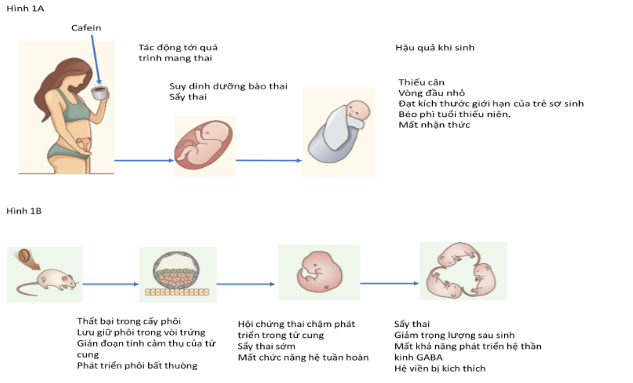Effects of Caffeine (coffee) during pregnancy
Translation and synthesis of Dr. Nguyen Khanh Hoa - Vinmec Institute of Stem Cell and Gene Technology
Epidemiological studies have shown that caffeine use during pregnancy has adverse effects on the fetus, but the underlying mechanisms are still unclear. The following article will talk more about this issue.
1. The impact of coffee during pregnancy
Recent animal studies at physiological doses have begun to dissect the adverse effects of caffeine during pregnancy related to tubal contraction, embryonic development, uterine receptors, and placenta contribute to pregnancy complications. More interestingly, the effects of caffeine were variable among individual animals in tightly controlled experimental settings, suggesting the potential for genome modification of these phenotypes, in addition to genetic variations. . Furthermore, caffeine exposure during sensitive periods of pregnancy can induce genomic changes in the developing fetus or even of the germ cells to induce developmental diseases in adulthood. into the next generations. We discuss the pioneering areas of these studies in light of newly published data.
2. Overview of the effects of caffeine (coffee)

Caffeine là chất kích thích tâm thần được sử dụng rỗng rãi trên toàn thế giới
Caffeine is the most widely consumed psychostimulant worldwide. In the US, about 70% of women continue to use caffeine during pregnancy. It has been reported that some women consume more than 300-500 mg of caffeine per day during pregnancy, which equates to about three to five 240 ml cups of coffee per day (According to fda.gov). Although caffeine consumption in adults has beneficial effects on neurological diseases (eg, Parkinson's disease and Alzheimer's disease), cardiovascular diseases (eg, coronary heart disease, stroke), some cancer (eg, prostate cancer, melanoma, liver cancer, breast cancer), liver disease (eg, cirrhosis) and type 2 diabetes, it has also been noted that Maternal caffeine use during pregnancy increases the risk of miscarriage or pregnancy complications, and its underlying mechanisms are just beginning to be revealed. Importantly, the effects of caffeine exposure on reproductive performance vary greatly from person to person, possibly as a result of the combined effects of genetic variations, genetic factors, and genetic factors. and the same environmental inputs tend to be individual sensitivities. Research on the effects of caffeine is heterogeneous.
Experimental studies in well-controlled animals can provide an ideal model by which to study the genetic and genomic bases of phenotypic variation that may account for different individual sensitivities for caffeine and thus could lead to precise pharmaceutical solutions in the future. In addition, recent studies have begun to provide evidence that caffeine exposure during pregnancy can cause adverse effects in offspring, or even subsequent generations, suggesting that downregulation of genes may be by embryonic or early fetal germ cells through the maternal environment; this has drawn considerable attention to the deeper mechanism. Here, with the latest findings, we discuss the emerging topics of pregnancy caffeine exposure, with a particular focus on animal and human studies relevant to physiological doses. may shed light on the effects of daily caffeine consumption.
3. Caffeine's Negative Effects on Pregnancy: Evidence from Humans

Bà bầu sau ba tháng đầu thì tỷ lệ trao đổi chất caffeine sẽ bị giảm
The harmful effects of caffeine on pregnancy health have received widespread attention since the 1980s. During pregnancy, the maternal caffeine metabolic rate decreases significantly, especially after the first trimester and The half-life of caffeine increases from 2.5 to 4.5 hours to about 15 hours late in pregnancy. Moreover, caffeine has the ability to lipidize to freely transport across all biological membranes, including the placental barrier of blood, whereas neither the fetus nor the placenta have enzymes for its metabolism; Caffeine absorbed by the mother's body can also accumulate in the fallopian tubes or the uterine fluid environment, potentially affecting the development and creation of embryos carrying diseases that appear in adults.
Epidemiological studies show that caffeine use during pregnancy is associated with intrauterine growth retardation (IUGR)/low birth weight syndrome, infertility, and spontaneous abortion (Figure 1A). The maximum safe caffeine dose for pregnancy has been previously published: daily intake of less than 300 mg of caffeine (about three cups of coffee) during pregnancy is considered unlikely to harm pregnancy health . However, this safe dosing is being reevaluated based on growing evidence that even daily doses of less than 300 mg may increase the risk of fetal distress. Furthermore, other studies show that even a daily intake as low as 100-200 mg during pregnancy is associated with an increased risk of miscarriage, fetal growth restriction, low birth weight, as well as increased risks to offspring, including impaired cognitive development, overweight, and obesity. These studies raise concerns that there may not be an absolute safe threshold for caffeine consumption during pregnancy.

Mẹ sử dụng cà phê ảnh hưởng đến kết quả mang thai và sinh con.
The Pathophysiological Effects of Caffeine on Pregnancy: Insights from Rodent Studies
(A) In humans, caffeine use during pregnancy may lead to pregnancy complications, such as: miscarriage, fetal growth restriction and low birth weight, which will also increase the risk of overweight and impaired cognitive development in childhood. (B) Potential mechanisms for the effects of caffeine as revealed by the rat model. Current studies suggest that maternal caffeine exposure not only severely disrupts embryo implantation, but also disrupts midterm fetal growth and development, leading to miscarriage, low birth weight, and low birth weight. and neonatal brain development on postnatal day 6 (P6).
Consistent with results from human epidemiological studies, caffeine exposure in rodents induced similar adverse effects on pregnancy outcome and fetal development (Figure 1B). In the following discussions, the caffeine dosage used in rodents is extrapolated to the equivalent of 1 cup of coffee in humans, based on circulating levels of caffeine after ingestion by the rodent. rodents or people. Rats exposed to high doses of caffeine, equivalent to about six or 12 cups of coffee in humans, 1 week before and throughout pregnancy, resulted in delayed conception, decreased maternal body weight and weight. placenta, as well as an increased risk of growth retardation in pregnancy, early miscarriage, and low birth weight.
Importantly, recent studies further reveal that brief exposure to caffeine during early pregnancy or even before intercourse can cause a wave of adverse effects throughout pregnancy. . Female rats given doses equivalent to six cups of coffee in humans, for 4 consecutive days before conception, had reduced fertility due to loss of embryo implantation. Disrupted embryo implantation was also found when rats were administered doses equivalent to nine cups of coffee or one to two cups of coffee per day in humans during preconception (Figure 1B).
These observations are closely related to human health and provide a warning about the use of caffeine before implantation and before any clinically recognisable signs of pregnancy. Furthermore, a series of studies have also demonstrated that a mother's diet during this period can also have a lasting effect on the health of her offspring.
Mechanistically, caffeine-induced implantation failure may be due to the fallopian tube's ability to delay embryo transport, since pre-implantation caffeine exposure leads to embryo retention in the isthmus of the fallopian tubes [35] ]; This animal observation is consistent with previous out-of-body data showing that caffeine has incapacitated the induction of electrical bradycardia activity and the basal rhythmic contraction of the common tubal smooth muscle. via a cAMP-dependent pathway. Impaired tubal embryo transport is detrimental to fetal development, as delays in transport have been shown to cause embryos to slip out of time of implantation and create an irregular ripple effect. beneficial in future embryonic development.
Caffeine use in the preimplantation period also disrupts early embryo development and compromised blastocyst quality, likely through a direct effect on developing embryos, as demonstrated by the use of caffeine in vitro or through secondary effects in animals involving disruption of the fallopian tube/uterine environment, or both. In addition, dysregulation of steroid hormone-regulatory genes, such as leukocyte suppressor factor (Lif), mucin 1 (Muc1), lactoferrin (Ltf), and ameraldgulin (Areg), is an important determinant important for uterine fertility, which was also found in the prepubertal uterine epithelium following caffeine administration, indicating impaired fertility (Figure 1B). All these factors can work together to cause abnormal implantation of the embryo and thus lead to pregnancy complications and pregnancy loss.
In addition to caffeine exposure in early pregnancy, caffeine exposure during mid and late pregnancy also leads to a range of adverse effects. For example, administering caffeine (with a dose equivalent to two human cups of coffee) to pregnant rats at embryonic day 8.5 might impair embryonic heart development and decrease myocardial area. as well as cardiac output and contractility, leading to compromised cardiac function in adulthood. When caffeine was given daily to pregnant rats for days 9.5 to 18.5, in a moderate dose equivalent to a human cup of coffee, it had the potential to disrupt the growth and cardiovascular function of pregnant rats. embryo (Figure 1B). Using adenosine A2A receptor antagonist and adenosine A1 receptor knockout mice, it has been shown that the effects of caffeine on cardiac function are mediated by blockade of adenosine receptor signaling.
Furthermore, the effects of caffeine on embryonic development may also be the result of impaired placental function, as demonstrated by decreased placental weight and structural abnormalities following administration Caffeine use during mid to late pregnancy in rats may be effected through chronic activation of the maternal and placental angiotensin systems and stimulation of the tumor gene-dependent apoptosis proteins p53. In addition, a single dose of caffeine on day 12 of pregnancy in rats significantly reduced blood flow to the maternal ovaries, uterus, and decidua (endometrium), possibly leading to vasoconstriction during the week. uterus and work with the placenta's ability to deliver nutrients to the developing embryo. Furthermore, increased serum adrenaline levels and a significant (25%) decrease in interstitial placental blood flow have been reported in pregnant women after drinking two cups of coffee during the third trimester. These findings suggest that caffeine exposure between and late pregnancy may have profound effects on both embryonic and placental development, and may explain the observed growth retardation syndrome. in utero in relation to caffeine use during pregnancy in humans.
(A) In humans, caffeine use during pregnancy may lead to pregnancy complications, such as: miscarriage, fetal growth restriction and low birth weight, which will also increase the risk of overweight and impaired cognitive development in childhood. (B) Potential mechanisms for the effects of caffeine as revealed by the rat model. Current studies suggest that maternal caffeine exposure not only severely disrupts embryo implantation, but also disrupts midterm fetal growth and development, leading to miscarriage, low birth weight, and low birth weight. and neonatal brain development on postnatal day 6 (P6).
Consistent with results from human epidemiological studies, caffeine exposure in rodents induced similar adverse effects on pregnancy outcome and fetal development (Figure 1B). In the following discussions, the caffeine dosage used in rodents is extrapolated to the equivalent of 1 cup of coffee in humans, based on circulating levels of caffeine after ingestion by the rodent. rodents or people. Rats exposed to high doses of caffeine, equivalent to about six or 12 cups of coffee in humans, 1 week before and throughout pregnancy, resulted in delayed conception, decreased maternal body weight and weight. placenta, as well as an increased risk of growth retardation in pregnancy, early miscarriage, and low birth weight.
Importantly, recent studies further reveal that brief exposure to caffeine during early pregnancy or even before intercourse can cause a wave of adverse effects throughout pregnancy. . Female rats given doses equivalent to six cups of coffee in humans, for 4 consecutive days before conception, had reduced fertility due to loss of embryo implantation. Disrupted embryo implantation was also found when rats were administered doses equivalent to nine cups of coffee or one to two cups of coffee per day in humans during preconception (Figure 1B).
These observations are closely related to human health and provide a warning about the use of caffeine before implantation and before any clinically recognisable signs of pregnancy. Furthermore, a series of studies have also demonstrated that a mother's diet during this period can also have a lasting effect on the health of her offspring.
Mechanistically, caffeine-induced implantation failure may be due to the fallopian tube's ability to delay embryo transport, since pre-implantation caffeine exposure leads to embryo retention in the isthmus of the fallopian tubes [35] ]; This animal observation is consistent with previous out-of-body data showing that caffeine has incapacitated the induction of electrical bradycardia activity and the basal rhythmic contraction of the common tubal smooth muscle. via a cAMP-dependent pathway. Impaired tubal embryo transport is detrimental to fetal development, as delays in transport have been shown to cause embryos to slip out of time of implantation and create an irregular ripple effect. beneficial in future embryonic development.
Caffeine use in the preimplantation period also disrupts early embryo development and compromised blastocyst quality, likely through a direct effect on developing embryos, as demonstrated by the use of caffeine in vitro or through secondary effects in animals involving disruption of the fallopian tube/uterine environment, or both. In addition, dysregulation of steroid hormone-regulatory genes, such as leukocyte suppressor factor (Lif), mucin 1 (Muc1), lactoferrin (Ltf), and ameraldgulin (Areg), is an important determinant important for uterine fertility, which was also found in the prepubertal uterine epithelium following caffeine administration, indicating impaired fertility (Figure 1B). All these factors can work together to cause abnormal implantation of the embryo and thus lead to pregnancy complications and pregnancy loss.
In addition to caffeine exposure in early pregnancy, caffeine exposure during mid and late pregnancy also leads to a range of adverse effects. For example, administering caffeine (with a dose equivalent to two human cups of coffee) to pregnant rats at embryonic day 8.5 might impair embryonic heart development and decrease myocardial area. as well as cardiac output and contractility, leading to compromised cardiac function in adulthood. When caffeine was given daily to pregnant rats for days 9.5 to 18.5, in a moderate dose equivalent to a human cup of coffee, it had the potential to disrupt the growth and cardiovascular function of pregnant rats. embryo (Figure 1B). Using adenosine A2A receptor antagonist and adenosine A1 receptor knockout mice, it has been shown that the effects of caffeine on cardiac function are mediated by blockade of adenosine receptor signaling.
Furthermore, the effects of caffeine on embryonic development may also be the result of impaired placental function, as demonstrated by decreased placental weight and structural abnormalities following administration Caffeine use during mid to late pregnancy in rats may be effected through chronic activation of the maternal and placental angiotensin systems and stimulation of the tumor gene-dependent apoptosis proteins p53. In addition, a single dose of caffeine on day 12 of pregnancy in rats significantly reduced blood flow to the maternal ovaries, uterus, and decidua (endometrium), possibly leading to vasoconstriction during the week. uterus and work with the placenta's ability to deliver nutrients to the developing embryo. Furthermore, increased serum adrenaline levels and a significant (25%) decrease in interstitial placental blood flow have been reported in pregnant women after drinking two cups of coffee during the third trimester. These findings suggest that caffeine exposure between and late pregnancy may have profound effects on both embryonic and placental development, and may explain the observed growth retardation syndrome. in utero in relation to caffeine use during pregnancy in humans.
4. Prenatal caffeine exposure: Implications for children's long-term health

Trong khi mang thai nếu sủ dụng caffeine sẽ ảnh hưởng đến sự phát triển cuat thai nhi
In addition to the adverse effects on pregnancy outcomes, caffeine use during pregnancy also affects long-term fetal development and promotes diseases in adulthood, thus reflecting the theory of developmental origins. development of health and disease (DOHaD). In humans, prenatal high-dose caffeine exposure has been shown to significantly increase the risk of acute lymphoblastic leukemia in children. If mothers consumed more than 200 mg of caffeine per day, their children were twice as likely to have poorer cognitive development and low IQ (intelligence quotient) at age 5.5, compared with mothers who ate less than 100. mg of caffeine per day.
Two additional independent studies both found that even low maternal doses of caffeine (<150 mg per day) during pregnancy were associated with an increased risk of overweight in infancy and overweight in infancy. poem. Rapid weight gain in infants with low birth weight is a major risk factor for subsequent developmental risks of cardiovascular or metabolic disease in adulthood. Impaired fetal growth and adult diseases due to pre-natal caffeine exposure were similarly found in rats, suggesting that maternal caffeine exposure from pregnancy to lactation may leads to possible long-term neurological and behavioral impairment in offspring (Figure 2).
5. Comments on conclusions and future prospects

Chỉ nên sủ dụng dưới 200-300 mg
The World Health Organization and the European Food Safety Authority recommend that daily caffeine use less than 200-300 mg as a safe dose for pregnant women. It is also important to note that the current maximum recommended dose may be too high for some people. At the molecular level, the mechanisms underlying the susceptibility and heritability of caffeine-induced disease remain unclear. Studies have provided both epidemiological and experimental evidence that more research is needed to study the mechanisms involved in the response to caffeine which may provide a new avenue for precision drug administration.
That said, developing a rapid and effective method for assessing an individual's sensitivity to caffeine would not only benefit women in pregnancy health management, but also provide a basis in individual drug use and drug discovery guidelines. For example, the major caffeine metabolizing enzyme, CYP1A2, could be pursued as a specific drug target and could be used as the basis of individual caffeine sensitivity tests in everyday life. Finally, by what mechanism and to what extent caffeine may affect the phenotype of offspring before or during pregnancy are intriguing questions requiring in-depth investigation.
Bài viết này được viết cho người đọc tại Sài Gòn, Hà Nội, Hồ Chí Minh, Phú Quốc, Nha Trang, Hạ Long, Hải Phòng, Đà Nẵng.






